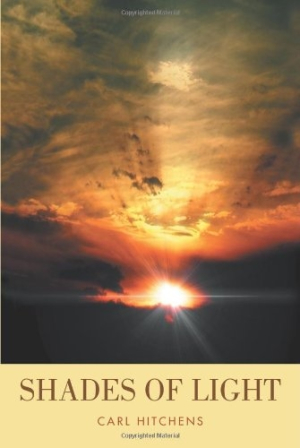Shades of Light
This poetry collection is a wide, bright vein of life that cracks open the tender, violent, imaginative earth we stand on.
The forty-two poems in Carl Hitchens’s newest collection, Shades of Light, represent a shimmering spectrum of human experience, from deep, spiritual love to a bloody loss on the battlefields of Vietnam. The book marks Hitchens’s second publication, and includes “Breath of Fire,” which was featured in the anthology Meditations on Divine Names.
Hitchens experiments with a variety of tones and topics that will appeal to a diverse readership. He writes, “By chapter and verse, we write ourselves into time, energy, and matter, fluctuating between luminous and faint, sublime and spiritless, civilized and primitive—until we sense that we are only space.” Writing into that space, Hitchens reveals the capacity for human experience in poems that are genuine, sensitive, and expressive.
Starting with that powerful invocation, Hitchens moves through a series of welcoming poems; the sun rises, the birds sing. The poems are orderly. Each is written in free verses that are arranged in neat, to-the-point stanzas. Although rhapsodic at times, Hitchens maintains his focus, and each poem reveals a deeper message.
The standout poem “Storm,” which describes a battlefield assault, does this beautifully. The images of war come down hard: “machine gun cracks the air with its whip of death, / pinning us like sheep for slaughter.” One at a time, the soldiers succumb to enemy fire and despair. At the same time, the poem offers courage and hope for redemption. “The day is still a pretty woman’s smile,” and once home, the narrator seeks “transformative unrest” that opens him to new understanding of his participation in the Vietnam War. The next poems, “Justice Warrior” and “I am Warrior,” offer redemption, and a deeper perspective on what it means to fight—whether the battle is emotional or external.
Readers familiar with Hitchens’s work may assume he deals exclusively with spiritual themes, but the poet has a lovely, salty sense of humor. In his poem “Katrina,” written to the hurricane that stomped New Orleans, he opens with the lines, “Oh Katrina, / what a woman you turned out to be.” He asks the storm, “Did you start out just showing off / and then got carried away / lost in your twirling—whirling / fancy-shawl dancing around?” His light touch creates new perspective into natural disaster, and as in the other pieces in this collection, offers the chance for healing.
Stuffed with strong lyricism and powerful imagery, Shades of Light represents a serious body of work. There’s enough material to fill three or four chapbooks, but Hitchens presents it all together, dense as a mother lode. The collection is a wide, bright vein of life that cracks open the tender, violent, imaginative earth we stand on.
Reviewed by
Claire Foster
Disclosure: This article is not an endorsement, but a review. The publisher of this book provided free copies of the book and paid a small fee to have their book reviewed by a professional reviewer. Foreword Reviews and Clarion Reviews make no guarantee that the publisher will receive a positive review. Foreword Magazine, Inc. is disclosing this in accordance with the Federal Trade Commission’s 16 CFR, Part 255.

